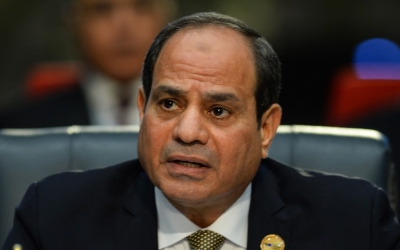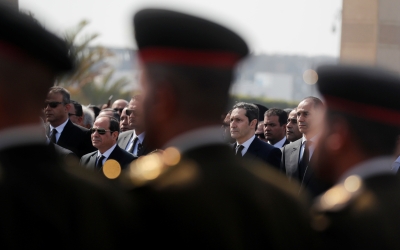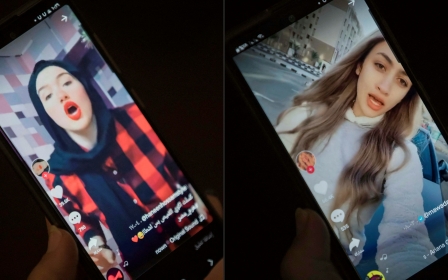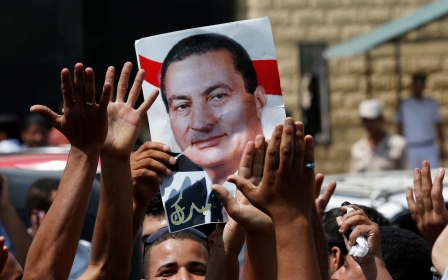Gym, spa and snooker: Egyptians condemn ‘seven-star prison’ for Mubarak officials

Revelations about the luxury detention enjoyed by the jailed sons and aides of the late Egyptian autocrat Hosni Mubarak have sparked anger online, given the majority of political prisoners in Egypt are incarcerated in squalid conditions.
In an interview broadcast on Tuesday on Nogoum FM radio, Egyptian musician Hani Mehanna recounted his experience in prison with Mubarak's two sons, Gamal and Alaa, as well as top businessmen and ministers imprisoned after the January 2011 revolution.
Mehanna, a supporter of the ousted president, said he was held for six months in 2014 in the Tora Agricultural Prison, part of the Tora Prison Complex where many prominent opposition figures and human rights advocates are also held.
'Hisham Talaat Mustafa built a huge mosque, and Ahmed Ezz built a gym and spa equipped with the latest technology, and there were ping-pong and snooker tables'
- Hani Mehanna
According to Mehanna, Mubarak’s sons, his interior minister Habib al-Adly, and business tycoons Ahmed Ezz and Hisham Talaat Mustafa were held in two exclusive buildings in the complex, where only 16 people were jailed. The officials were imprisoned for charges ranging from financial corruption to the killing of protesters.
The two Mubarak sons were released in 2015.
New MEE newsletter: Jerusalem Dispatch
Sign up to get the latest insights and analysis on Israel-Palestine, alongside Turkey Unpacked and other MEE newsletters
“We were 16 people staying in two buildings that could accommodate 3,000 people,” he told the radio host, Youssef al-Husseini.
“Hisham Talaat Mustafa built a huge mosque, and Ahmed Ezz built a gym and spa equipped with the latest technology, and there were ping-pong and snooker tables,” he recalled.
“I was shocked at the beginning. But then Alaa got me a TV and Gamal got me a fridge.
“I played football with them. Me and Alaa had a team, and Gamal had a team with some jailed officers. Habib al-Adly sometimes was the referee.”
The revelations came as a stark contrast to what detainees suffer in the maximum-security Scorpion Prison, which is located in the same complex as the Tora Agricultural Prison.
A report by Human Rights Watch, published last month, cited a leaked video recording showing dire conditions in the jail, “which almost completely deprive inmates of adequate ventilation, electricity, and hot water”.
The prison holds nearly 800 political prisoners, most of them in solitary confinement. At least 14 prisoners have died in Scorpion Prison since 2015, due to various reasons, including medical negligence and torture, according to several rights groups.
Egyptian authorities do not allow any independent oversight of places of detention in the country, and the government deals with prison issues in extreme secrecy.
The state-sponsored National Council for Human Rights said in May 2015 that police stations were 300 percent over capacity, and prisons 160 percent overcapacity.
Human rights groups estimate that at least 60,000 political prisoners are being held in Egyptian jails under general-turned-president Abdel Fattah el-Sisi, who seized power in 2013.
Sisi's government has denied this, claiming in a 60 Minutes interview in 2019 that "there are no political prisoners in Egypt".
‘Seven-star prison’
The radio interview has triggered condemnation of the discrepancy between prison conditions for Mubarak officials and those for critics of the Sisi government.
May Azzam, an Egyptian journalist, described Mehanna’s comments as “a special video for the 25 January anniversary”.
“This is to send a message to the revolutionaries to regret taking part in the revolution for the rest of their lives," she said in a Facebook post.
“A seven-star prison for all Mubarak’s men who had been convicted following 25 January. Spacious rooms, a spa, air conditioners, fridges, TVs, fresh food every day, snooker and ping-pong tables, and a football pitch. The only thing missing is hiring dancers and singers to perform for them in prison,” she added.
“On the other hand, the biggest wish for prisoners of conscience is to have a mattress for their iron bed, or an extra blanket for the cold, or medicine for their chronic illnesses, to stay alive.”
Gamal Eid, a lawyer and human rights defender, highlighted the stark difference between the luxurious jails referred to by Mehanna and those where the majority of pro-democracy activists are incarcerated.
سمعت وعرفت من هاني مهنى أوضاع سجن رموز مبارك ؟!
— Gamal Eid (@gamaleid) January 11, 2021
دي صورة لموكل " ضحية" في زنزانة ، بيعتبرها لحظة جيدة واستثنائية ، لانها فاضية شوية.
دي اوضاع السجون الحقيقية للمنتمين لثورة يناير والمطالبين بالديمقراطية في مصر. pic.twitter.com/KEJniUZWml
Translation: “Have you heard from Hani Mehanna about the jails where Mubarak’s henchmen are held? This is an image of a 'victim' in a prison cell. He considers it good and exceptional, because it’s a little bit empty. These are the real prison conditions for supporters of the January revolution and democracy in Egypt.”
While Gamal and Alaa Mubarak have not commented publicly on the radio interview, the former head of Egypt’s prisons authority, Mohamed Naguid, denied Mehanna’s allegations. In a statement to BBC Arabic, he said: “I have contacted those responsible for the prison, and they confirmed that what has been said was totally untrue.”
The prosecution of Mubarak and his sons for corruption and repression was one of the main demands of the pro-democracy protesters in 2011.
The brothers were sentenced to three years in jail in 2015, along with their father, after being convicted of using public funds to upgrade family properties.
However, the sons were released in the same year, after having already served three years, pending the case.
Mubarak himself was released in 2017 after a court acquitted him of ordering the killing of protesters during the revolution.
Opponents of Mubarak have widely condemned what they consider to be his preferential treatment compared with his successor Mohamed Morsi, the country's first democratically elected president.
Morsi died after collapsing in a courtroom in Cairo in June 2019. He had spent six years in detention, following a coup against him led by Sisi.
Rights groups and an independent UN inquiry have attributed his death to medical negligence and the "inhumane" circumstances of his solitary confinement.
Mubarak died in February last year at the age of 91, and his funeral was attended by Sisi and his top government officials.
This article is available in French on Middle East Eye French edition.
Middle East Eye delivers independent and unrivalled coverage and analysis of the Middle East, North Africa and beyond. To learn more about republishing this content and the associated fees, please fill out this form. More about MEE can be found here.






